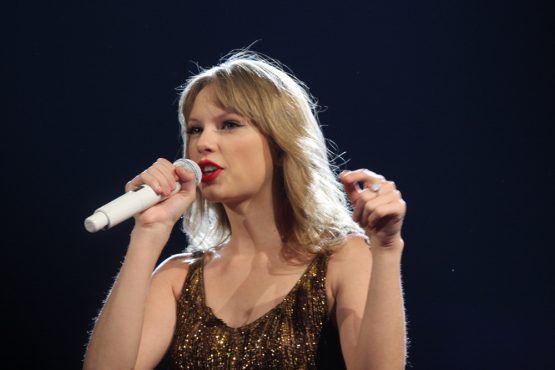Taylor Swift’s Reputation is an ostentatious display of who she’s become as a person, an artist, and, subsequently, an icon.
For anybody out of the loop, long gone are Swift’s white linen dresses and Tim McGraw roots. On her sixth studio album, she has taken it upon herself to pick up the shovel and bury who she once was. The first single released from Reputation, “Look at What You Made Me Do,” features Swift declaring “the old Taylor is dead” in a voicemail message. Sure, there are a few eyebrow-raising duds scattered among the 15 tracks, but, overall, Swift rises to the occasion as our generation’s queen of pop.
The album presents itself to the world with sardonic, black-and-white cover art. Half of her face in the head shot is covered by the name “Taylor Swift” written in overlapping mastheads. The word “Reputation” appears in a New York Times-esque font. She’s made old Hollywood glamour uncomfortable to look at — bold lips and sultry eyelids meeting flared nostrils and a silver chain choker around her neck. You win, Taylor: we’re all talking about you.
After a three-year hiatus, Swift’s latest album is a continuation of the styles she experimented with on 1989. She’s cultivated pop norms, using autotune and reverb as musical instruments. Overall, Reputation has a colossal sound, structured by an EDM and hip-hop influence.
The opener, “ . . . Ready for It?” starts with a momentum-filled, distorted, ascending bass line fuelled by sparse drum machine beats. It’s trendy from start to finish, complete with Swift rapping in between choruses. The rapping itself isn’t out of place, but her tone lacks the intensity to back up her demeanour. (Or should I say swagger?)

Photo by Eva Rinaldi via Flickr
Her singing saves the track — it’s scintillating through hard-hitting production.
Swift turns the rapping over to American rapper Future on “End Game.” That’s not the only improvement; here, her new aesthetic becomes convincing. She starts coy, asking to be someone’s “A-Team” over a warm synth progression. This explodes into Swift reciting “biiiig reputation,” addressing her high profile enemies (look out, Kanye West), with roaring “ohhs” and “ahhhs” in between. Ed Sheeran is also featured on the track (bringing the A-Team reference full circle), and together the three artists develop a paradoxical, but intriguing fusion of their genres.
For someone who’s fighting to seem mature, several songs are a bit juvenile. “Look What You Made Me Do” is sprinkled with sound effects reminiscent of a villain’s motif in a children’s movie. It’s made worse by the spoken word chanting of the title. By the end, we still don’t really know what she had to do — just that she’s relying on karma for revenge. On “Dress,” Swift devotes an entire song to lust and sex, as though she’s trying to advertise her loss of innocence to the world once again. She’s no Yoko Ono, but the panting and not-so-subtle lyrics (“say my name / only bought this dress so you could take it off”) are a bit overdone in pop by now.
Fortunately, there’s no lack of redemptive songs. “King of My Heart” pairs ethereal, reverb-elevated vocals with a dubstep backdrop in her declaration of affection. “Gorgeous” is painfully relatable and hilarious (“You should take it as a compliment / that I’m talking to everyone here but you,” she sings over crisp beats). “Delicate” is on par with the work of top R&B artists at the moment: elegant, refined, and evoking the dimly lit atmosphere we’re all craving.
Regardless of whether or not Swift is happy with her present image, Reputation proves her mastery in all forms of popular music. This is the critical, career shifting album she needed to put out to become a millennial legend. It’s synth-pop, it’s electronic, it’s R&B and, most of all, it’s her.







